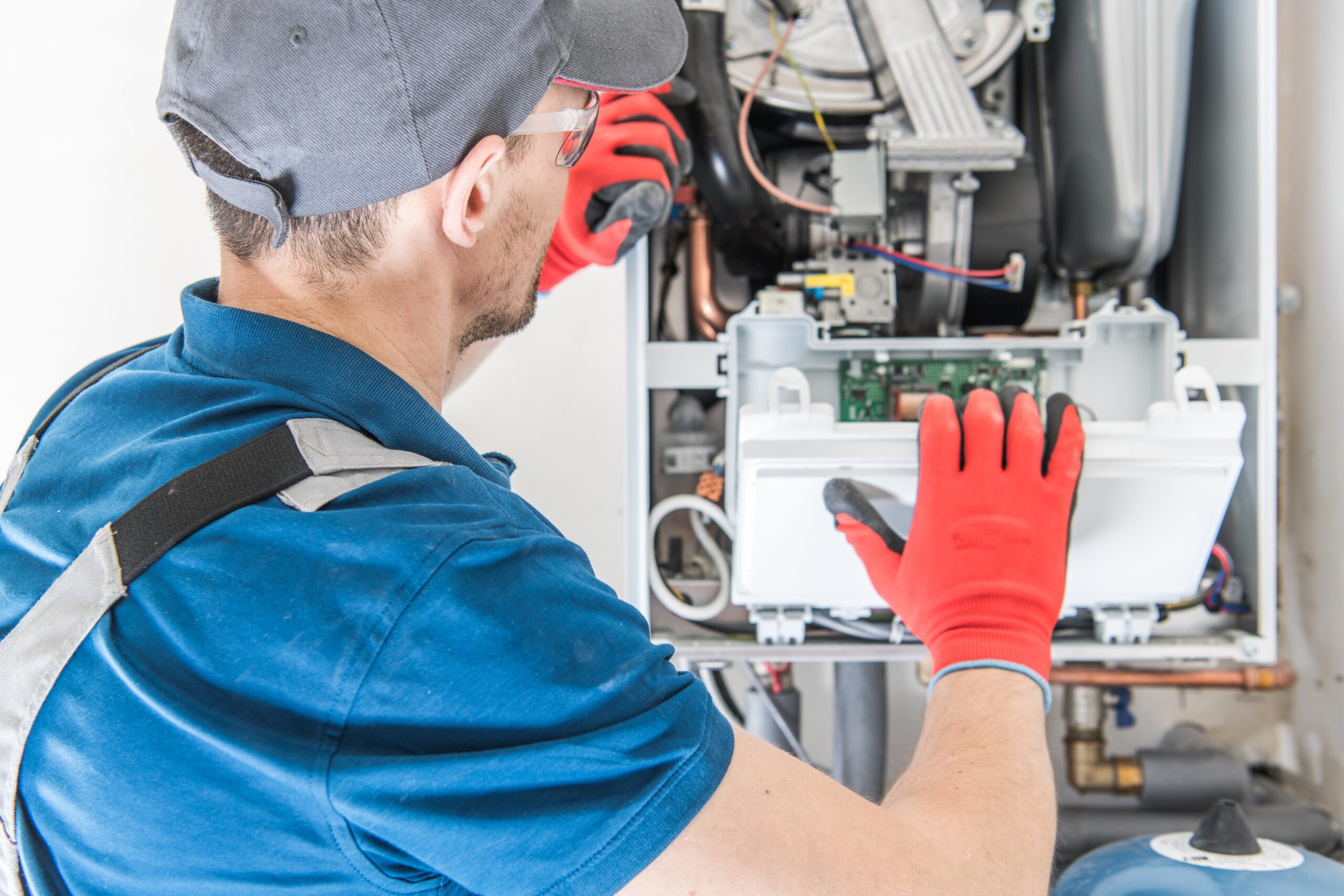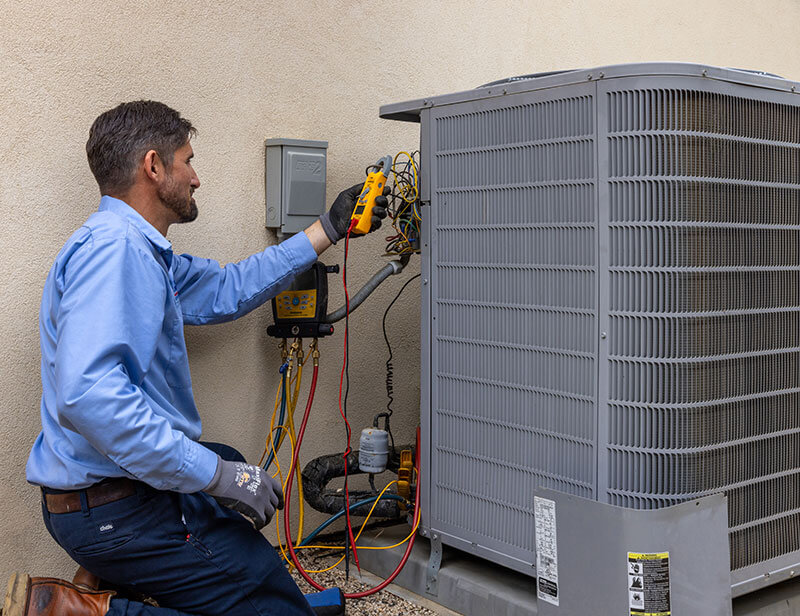5 Must-Know Facts About ductless mini splits Before You Upgrade
5 Must-Know Facts About ductless mini splits Before You Upgrade
Blog Article
Choosing Between a Warm Pump and Heating System: Key Factors To Consider for Your Heating And Cooling Needs
When examining heating choices for cooling and heating needs, the choice between a heat pump and a furnace can be intricate. Each system uses distinctive benefits tailored to specific climates and energy performance objectives. Comprehending these distinctions is crucial for making an enlightened option. Trick factors such as setup prices and environmental impact better make complex the selection process. Which alternative truly aligns with one's comfort and sustainability choices? The following sections will certainly discover these considerations carefully.
Recognizing Heat Pumps: How They Function and Their Advantages
While numerous homeowners take into consideration numerous home heating options, understanding just how warmth pumps function and their advantages can greatly affect their decision. Heatpump operate by transferring warm as opposed to creating it. In the winter months, they extract warm from the outside air or ground and transfer it indoors, while in the summer, they reverse this process, cooling down the home by removing warm outside. This dual functionality makes them functional for year-round climate control.One of the main benefits of warm pumps is their power performance. They utilize substantially much less electricity compared to standard furnace, possibly causing lower utility costs (heat pump replacement ooltewah tn). In addition, warm pumps have a smaller carbon impact, making them an eco friendly selection. They likewise require much less maintenance than standard systems, adding to long-lasting expense financial savings. Generally, recognizing the auto mechanics and benefits of heat pumps can assist house owners make educated choices regarding their home heating and cooling requirements
Discovering Heaters: Types, Procedure, and Advantages
Heaters come in numerous types, including gas, electric, and oil models, each with unique functional devices. Understanding these differences is essential, as they affect performance and home heating performance. Furthermore, heating systems supply numerous benefits, such as constant warm outcome and reliability in cooler climates.
Types of Heaters
Heater can vary substantially in design and operation, with heating systems being a preferred option amongst house owners. There are a number of sorts of furnaces, each using different fuel sources and modern technologies. Gas heating systems prevail, leveraging gas to produce warmth successfully. Electric heaters, on the other hand, use electric resistance to generate warmth, often preferred for their uncomplicated setup. Oil furnaces, while much less common, work in locations with minimal gas gain access to (furnace replacement). In addition, condensing heating systems optimize power effectiveness by catching and reusing exhaust gases. Each type runs through a system of heat exchangers and ductwork to disperse warm air throughout a home. Understanding the distinctions in between these heater kinds is crucial for educated HVAC choices
Advantages of Furnaces
For home owners seeking trustworthy heat during cold months, the advantages of heating systems are significant. Heating systems offer consistent home heating, guaranteeing even temperature levels throughout the home. They are particularly efficient in extreme chilly, frequently exceeding warm pumps in icy conditions. Various types, including gas, electrical, and oil heaters, supply adaptability to satisfy varied requirements and preferences.Furnaces likewise have a tendency to have lower first installment prices compared to heatpump, making them an extra available option for many. Their durable layout adds to a longer life expectancy, with several systems lasting over 15 years with correct upkeep. In addition, modern-day heating systems are frequently equipped with advanced technology for enhanced effectiveness, which can result in decreased energy bills. In general, furnaces remain a reliable selection for effective home heating.

Energy Effectiveness: Comparing Warmth Pumps and Furnaces
When comparing power effectiveness between heatpump and heaters, the Seasonal Energy Efficiency Proportion (SEER) plays a necessary role in establishing performance. In addition, a functional expense analysis reveals the lasting financial effects of each system. Understanding these aspects can lead house owners in making educated decisions regarding their heating solutions.
Seasonal Power Performance Ratio
Power performance plays an essential duty in the decision-making process in between warm pumps and heaters, especially when taking into consideration the Seasonal Power Performance Ratio (SEER) This metric procedures the cooling efficiency of heatpump over a whole air conditioning period, offering a standardized way to review efficiency. Greater SEER scores show greater energy effectiveness, equating to lower energy usage and minimized utility costs. In contrast, heating systems are normally examined making use of the Annual Fuel Application Performance (AFUE) rating, which mirrors heating performance. When comparing these two systems, home owners need to prioritize SEER scores for heat pumps, as they directly effect overall energy savings and ecological sustainability. A complete understanding of SEER can notably influence the lasting complete satisfaction and cost-effectiveness of the picked HVAC solution.
Functional Expense Analysis
Recognizing the operational costs linked with heatpump and heaters is vital for property owners reviewing their options. Warm pumps usually offer greater power efficiency, transforming electrical power into heat with minimal waste. This results in lower regular monthly utility costs, especially in moderate environments. On the other hand, standard heaters, particularly gas designs, might have reduced upfront expenses yet can incur greater functional expenses in time as a result of sustain rates and effectiveness ratings.Moreover, warm pumps can work as both heating and cooling systems, potentially reducing the requirement for different heating and cooling units. While first investments for heatpump may be greater, their long-term financial savings in power effectiveness can make them an extra economical option for many houses. Cautious analysis of regional power rates is vital to establish the very best choice.
Installation Costs: What to Anticipate for every Heating System
Installment expenses for furnace can vary substantially in between heatpump and heating systems, influencing homeowners' choices. Warm pumps typically have greater upfront setup costs, normally varying from $3,500 to $8,000, depending on the unit dimension and complexity of setup. This consists of the exterior system, indoor handling system, and necessary ductwork modifications. Alternatively, furnaces tend to have lower preliminary prices, balancing in between $2,500 and $6,000, which can be appealing for budget-conscious homeowners. Nonetheless, installment expenses can enhance if considerable ductwork is required.Moreover, the selection of gas kind for heating systems-- all-natural gas, propane, or electrical-- can likewise influence installment expenses. While warmth pumps use power performance, their initial investment might prevent some buyers. Eventually, evaluating installment costs along with long-term savings and efficiency will certainly assist house owners in making informed decisions concerning their heating systems.
Climate Considerations: Which System Executes Much Better in Your Location
Just how do climate problems influence the performance of furnace? The performance of heatpump and furnaces can vary greatly depending on the neighborhood climate. In modest climates, heat pumps succeed by successfully moving warmth from the outside air, making them an energy-saving alternative. Nonetheless, their effectiveness reduces in exceptionally cold temperatures, where they may battle to draw out enough heat. Conversely, heating systems, specifically gas models, provide constant and trustworthy warm no matter of exterior problems, making them more effective in colder regions.In areas that experience milder wintertimes, warmth pumps can run effectively year-round, supplying both heating & cooling. In contrast, regions with rough winter seasons usually take advantage of the effectiveness of heaters. Eventually, understanding the local environment is important when making a decision in between a heat pump and a heating system, as it directly influences their operational effectiveness and overall efficiency.
Maintenance Requirements: Long-Term Take Care Of Warm Pumps vs. Furnaces
While both heatpump and furnaces require routine maintenance to ensure peak efficiency, their particular requirements and treatment regimens vary substantially. Heating systems generally need less regular attention, with yearly assessments sufficing to examine for gas leakages, clean filters, and analyze total functionality. Their easier style usually permits uncomplicated repairs.In contrast, heatpump demand biannual maintenance due to their twin duty in home heating and cooling. This consists of cleaning coils, examining cooling agent degrees, and making sure that both the interior and outside systems work at their finest. In addition, heatpump maintenance commonly includes more intricate components, making professional maintenance essential.Neglecting maintenance can cause lessened performance and increased energy costs for both systems. Eventually, homeowners ought to take into consideration these long-lasting treatment demands when choosing in between a heatpump and a heater, as positive maintenance can extend the lifespan and performance of either system considerably.
Ecological Influence: Picking a Lasting Heating Choice
The ecological impact of home heating systems is a vital examination for home owners looking for lasting choices. Heat pumps are generally a lot more energy-efficient than standard heating systems, as they transfer warmth as opposed to create it, substantially lowering carbon emissions. By using renewable resource sources, such as air-source or geothermal warm pumps, homeowners can better lessen their ecological footprint.On the various other hand, all-natural gas heaters discharge greenhouse gases and contribute to air contamination, though they typically supply higher heat result. Nonetheless, developments in innovation have brought about the advancement of high-efficiency heaters that decrease emissions.Ultimately, selecting a heater entails considering effectiveness against hop over to these guys environmental impact. Property owners are encouraged to review neighborhood power resources and incentives for renewable systems, making certain a choice that aligns with both individual comfort and ecological obligation. The decision impacts not only prompt convenience but additionally long-lasting sustainability and environmental wellness.
Often Asked Concerns
The Length Of Time Do Warm Pumps and Furnaces Generally Last?
The life-span of warm pumps normally varies from 15 to two decades, while heaters can last in between 15 to three decades. Routine maintenance considerably influences their longevity and effectiveness in giving heating options.
Can I Use a Heatpump in Extremely Cold Climates?
Heatpump can operate in extremely chilly environments, but their performance lessens as temperatures drop. In such conditions, extra home heating resources may be required to preserve comfortable interior temperatures and assure peak efficiency.

What Is the Sound Degree of Heat Pumps Versus Furnaces?
The sound degrees of heatpump and furnaces vary substantially. Usually, warm pumps run even more quietly than standard heaters, making them better for those delicate to seem, while furnaces may produce louder functional sounds during heating cycles.
Are Heat Pumps Suitable for Both Heating & Cooling?
Heat pumps are without a doubt appropriate for both home heating and cooling (heat pump service). They function by transferring heat, offering reliable temperature control year-round, making them a versatile choice for house owners looking for an all-in-one HVAC option
What Dimension Heater Do I Required for My Home?
Determining the appropriate dimension heater explanation for a home requires assessing variables such as square video footage, insulation high quality, regional environment, and the home's layout. Consulting a specialist can guarantee an exact evaluation and optimal convenience. Heat pumps commonly supply greater energy effectiveness, converting electrical power right into warm with marginal waste. In modest environments, warm pumps excel by successfully transferring warmth from the outdoors air, making them an energy-saving alternative. Alternatively, heating systems, especially gas designs, offer dependable and consistent warm regardless of exterior conditions, making them preferable in chillier regions.In locations that experience milder winters months, heat pumps can run effectively year-round, offering both heating browse around this web-site and air conditioning. Warm pumps are typically more energy-efficient than standard heating systems, as they transfer heat rather than create it, substantially minimizing carbon emissions. By making use of eco-friendly power sources, such as geothermal or air-source heat pumps, house owners can better reduce their eco-friendly footprint.On the other hand, all-natural gas heaters discharge greenhouse gases and contribute to air contamination, though they frequently give higher heat result.
Report this page